
With a BA degree often no longer enough to access top employment and academic opportunities, more students are enrolling in postgraduate education to better their career prospects and intellectual enrichment.
For universities that offer master’s programs, this presents a great opportunity. Top master’s prospects often possess sky-high GPAs, impressive research experience, and other unique qualities, and adding them to a school’s community can have great benefits.
The increase in student interest in master’s programs also presents a challenge. How best can a school approach attract a cohort of the most innovative and driven postgraduate applicants?
Here is what you need to know about the laws of attraction for top master’s students.
What are Ambitious Master’s Applicants Looking For From Programs & Schools?
To develop effective strategies for master’s student recruitment, it is important first to understand what top candidates are looking for. This information can provide a useful basis for crafting messaging that will speak to the concerns of master’s applicants and get them excited about the idea of attending your institution.
Research conducted by QS Digital Solutions last year into the motivations of master’s applicants from emerging markets found that the concerns of prospective graduate students largely concentrate on a handful of key areas. About 47 percent of respondents said they considered the reputation of the particular department to which they would apply the most critical factor in their decision. Other top concerns noted by many respondents included the school’s reputation, at 45 percent, and employment prospects after completing the program, at 40 percent.
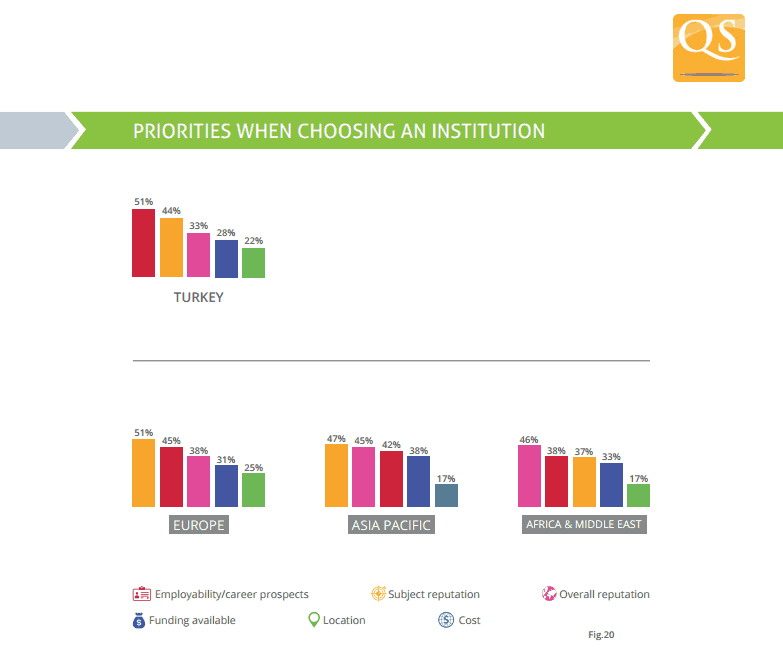
To attract the highest quality master’s applicants to your program, it is vital to demonstrate to master’s applicants the unique value your institution has to offer within these crucial areas of concern. Later in this post, we’ll discuss ways you can do so.
Where Are Master’s Applicants Doing Their Research?
When attracting high-quality master’s applicants, you can maximize the return on your investment by concentrating your efforts on the key channels master’s students refer to most frequently. Putting your dollars and effort where they will produce the best results can lead to a faster turnaround and greater overall recruitment results from your marketing efforts.
For example, the University of Nebraska-Lincoln researched in 2014 into the decision-making process of applicants applying to a Student Affairs Master’s program. The school found that the information sources prospective applicants were most likely to focus on were the school’s website and the course’s program page. Per the survey, “Quantitatively they seek a great deal of information from these sites and qualitatively feel as though with a bad website as a first impression the search to pursue the specific program is over.” The single greatest priority for schools should be establishing an engaging website and program page that immediately impresses and informs prospective applicants.
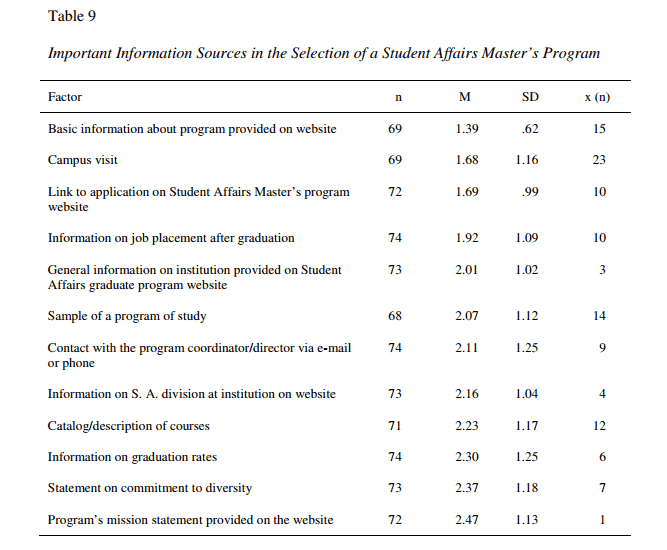
The survey revealed that other key avenues that master’s applicants use during the research process include visiting campuses and directly contacting a program coordinator by email or telephone.
What Can Your School’s Website Do Better to Attract Top Applicants?
With an understanding of what prospective master’s students want and where they look for assurance that a school will provide it, ambitious institutions can take steps toward producing materials and services that can attract these individuals. Here are some key strategies to employ on your website for Master’s applicant recruitment.
Create Informative & Attention-Grabbing Website Content
The pages of your website about the master’s programs you hope to promote must include all the information a prospective student needs to know to apply. To speak to the ambitious, career-focused mentality of master’s students, these four areas should be of greatest concern for most programs:
- Detailed information about the program’s courses, structure, and acclaim or standing
- Clear examples of potential career or further education paths for graduates
- Clear instructions regarding the application and admissions process
- Optimized content to improve your search engine rankings
Information on these pages should be current & relevant to what an incoming student can expect from the application process to acceptance and eventual program completion.
Whenever possible, the information should also be presented in a way that highlights the unique value proposition of your master’s programs. Alert applicants to the illustrious reputation your school has cultivated over the years or to the inclusion of experiential learning modules or internship opportunities that can help provide skills for an eventual career. Master’s programs that have strong industry links or a good track record of graduate success should also seek to highlight those points wherever possible.
Other great selling points include interesting academic possibilities like interdisciplinary courses or a fast track to a PhD. To attract a top master’s applicant, strive to catch their eye or imagination with something unique that suggests attending would result in real and lasting benefits for their career.
Example
The University of Warwick’s Diamond Science and Technology MSc hits every mark nearly perfectly. The website offers a clear overview of the program’s structure, focus, and expected outcomes – including a path to a future PhD. It also highlights the opportunity for students to participate in research projects with interesting institutions and companies.
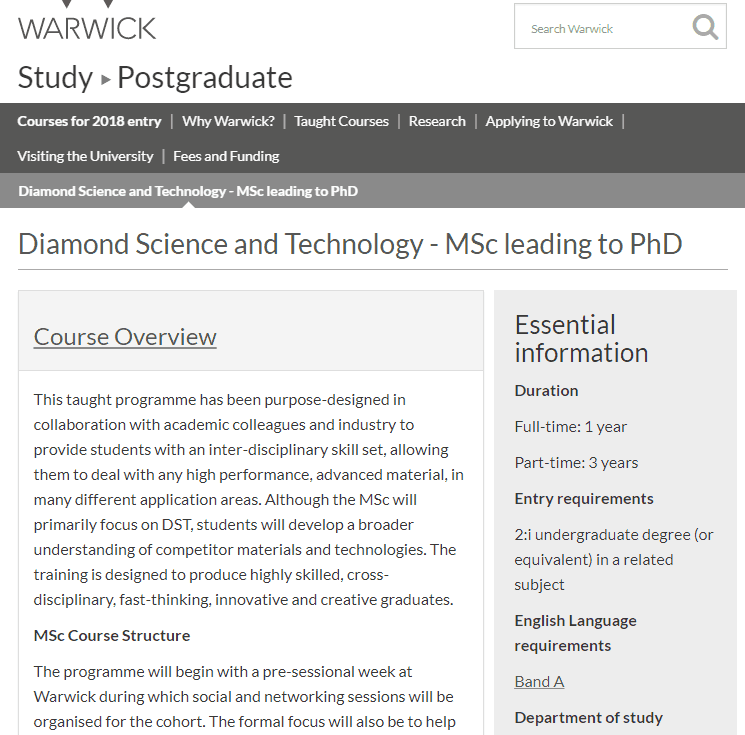
Facilitate a High Level of Engagement with the School & Staff
As personal interaction with staff and visits to the school represent critical areas for targeting by institutions hoping to attract top master’s applicants, it is important to offer high-quality, accessible services in this domain and to promote them heavily online.
As a starting point, information about open house events, campus tours, and other engagement events should be readily available online and at the school. Phone and email information for select program staff and admissions advisors should also be easily found on your website.
Example
ESMT Berlin offers prospective executive MBA applicants multiple options to engage with program staff, including direct email and telephone contact information for the program’s Associate Dean.
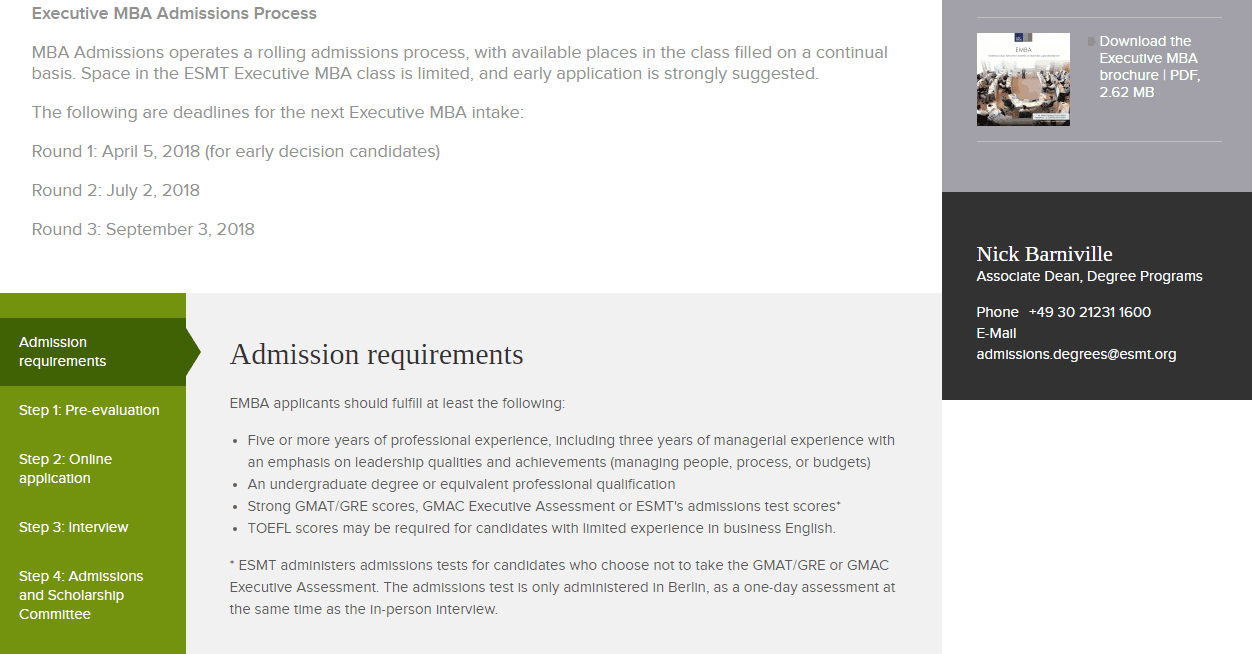
Highlighting the option to book campus tours, attend open days, or other recruitment events can also pay actual dividends to potential Master’s applicants. These events can be a great way to attract applicants with a strong likelihood of conversion, so you should include signup forms on your website wherever possible. Since these are high-value leads, following up by both email and phone before and after your events is also crucial.
Generate High-Quality Content to Improve Search Engine Optimization for Master’s Programs
Good search engine rankings are one of the most important factors in attracting the attention of great master’s students at the beginning of their research process. To improve search engine ranking, it is important to establish an institution or department as a trusted and authoritative voice. This can be accomplished by creating useful online content that observes SEO best practices.
There are several forms of content that universities should invest in creating or optimizing to improve their SEO and attract great master’s applicants. Blog posts relating to the master’s programs are an excellent place to start. These might explore topics or subjects covered in the course, skills learned, guides for success in a particular master’s program, etc.
Relevant pages on your institution’s website, such as program pages, are important examples of content that must be created and optimized according to SEO best practices. Best practices for SEO dictate that web pages should have a title, H1, and H2 tags that are accurate and informative and include relevant keywords where possible.
Example
Using the H1 and H2 tags on the program page for the London Business School’s MBA program is a good example of effective keyword integration. Both ‘MBA programme’ and ‘flexible MBA’ are likely among prospective MBA students’ top search terms.
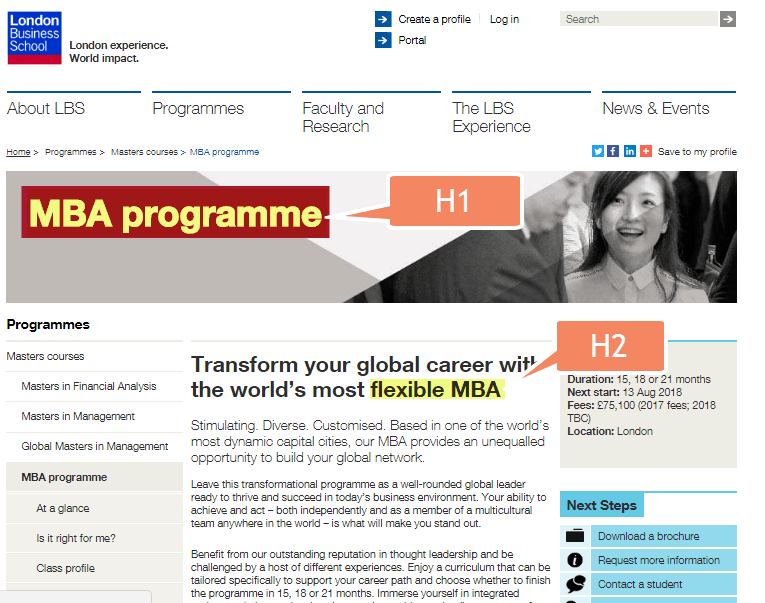
Naturally integrating keywords within the body text can also help boost your search rankings. In addition, while it does not have a direct impact on SEO, eye-catching meta descriptions can entice search engine users to click through to your site, thus improving your page authority.
Harnessing Social Media and Paid Advertising for Greater Exposure & Engagement
Though a well-composed and informative website is an important step toward recruiting the best master’s applicants, it’s also important to invest time and resources into web tools that can help deliver your message to the prospects you desire. Here are some tips for harnessing the power of social media marketing and paid advertising to draw top master’s prospects to your school.
Create a Strong Social Media Strategy to Reinforce Other Engagement Channels
Social media engagement among prospective students is increasing all the time, particularly as students with deep histories of social media use reach the age of graduate school eligibility. This makes social media marketing an important area universities should invest in.
Social media platforms offer a unique combination of services that can mimic and enhance several of the strategies employed by your school’s website and the direct engagement channels noted above.
Professional social network LinkedIn may also be of particular use to universities looking to promote Master’s options that attract more mature applicants who are already in the workforce, such as MBA programs. Popular sites like Facebook and Twitter can also serve as strong communication tools that can facilitate messaging between your institution and interested prospects, with a sense of immediacy and access that is a step beyond email.
Facebook, in particular, has introduced valuable features over the past few years that can be powerful tools for use in master’s student recruitment strategies. Facebook Live, for example, can make it easy to run Q&A sessions, offer live virtual tours or speeches, and other offerings to help engage with prospective students remotely. Creating and advertising these kinds of opportunities specifically for master’s programs can be a great way to attract greater curiosity and engagement from potential applicants, hoping for deep, accessible insight into your school and programs.
Example
The Maastricht University School of Business and Economics live-streamed a speech from their most recent Master’s Open Day using Facebook Live, gaining over 2,400 views on the site.
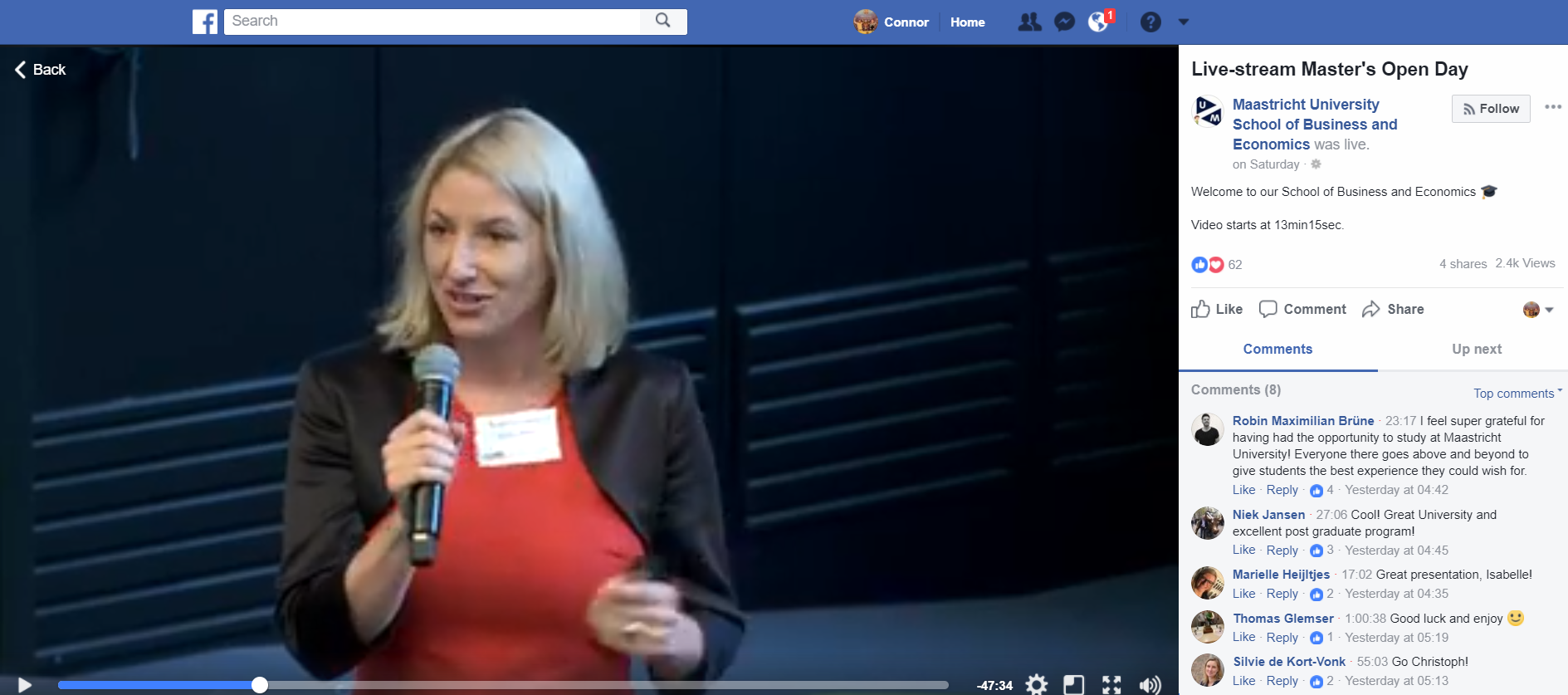
Finally, paid social media advertising usually offers several different targeting options to paid search and display ad platforms, including the option to target users by education level. This can make them a good choice for universities looking to develop an advertising strategy for their master’s programs, helping to ensure they only reach qualified applicants.
Run Year-Round, Informative, Targeted Paid Search Campaigns to Attract Great Master’s Applicants
Paid search advertising using Google AdWords offers a compelling solution for institutions hoping to maximize the ROI of their marketing budget. To create an optimal PPC campaign for attracting great master’s applicants through search, there are a few important factors to consider.
For one thing, the lead time for student recruitment is typically quite long; students may spend months, or even years, researching postgraduate opportunities. Additionally, in a report by Study Portals titled “International Students’ Study Choice Patterns,” it was found that students around the world do not tend to begin their research or submit applications at the same time of year. To only run paid search initiatives for a few months of the year would come with the risk of missing out on great international applicants. For this reason, it is best to maintain a year-round paid search strategy for master’s programs.
It is also important to ensure the links included within PPC ads are directed to pages designed expressly for the purpose of encouraging connection with visitors, and that help move them through your conversion funnel. Purpose-made landing pages will be more appropriate for this purpose than an existing program page on the department website. Include information about the program, a short contact form, and some form of content reward – like an info package – to entice visitors to fill out the form and become leads. In order to nurture the relationship and encourage eventual enrolment, these individuals should be followed up with relatively soon.
Example
WU Executive Academy use customized landing pages for campaigns to promote their Professional MBA programs.

Lastly, paid search ad campaigns are built around keywords, making it relatively easy to associate them with your master’s programs. It is important, however, to include keywords that do not perfectly match program or course offerings in your campaigns. For example, an institution that offers a Master of Arts in Creative Writing may want to bid on a keyword matching that program name but also bid on the keyword “Master of Arts in Writing” or other similar variants. This can help a campaign reach qualified, interested individuals who search for something that does not perfectly match the institution’s program but who will likely be interested in it all the same.
In addition to their professional and academic ambitions, some students want to study in a particular place. As a result, it can also be advantageous to include localized keywords for your city, state, or region; for example, ‘Master of Arts in Creative Writing in London’.
Persona Development for Master’s Student Recruitment
Persona development will be key to developing content, keyword, and campaign strategies to attract the ideal applicant for your master’s program. Consider the concerns and desires outlined at the beginning of this post when coming up with the motivations of your persona, and write content addressing those qualities. This can help personalize your efforts and is a useful way to keep your overall campaigns focused.
Example
The University of Louisiana at Lafayette Department of Biology blog offers posts about topics relevant to prospective postgraduate students. Keywords like “graduate degree in biology” appear in the title, meta description, and content.

Master’s students represent a category of growing importance for schools around the world. The creation and maintenance of sound university recruitment strategies for communicating with this audience, particularly regarding the career potential that awaits graduates, is vital for attracting the best and brightest of this group. Employ a multifaceted approach addressing the key areas of web presence, direct engagement channels, and social media offerings to create the comprehensive base necessary for communicating with – and recruiting from – the best of these would-be graduate students.
FAQ To Consider:
How do you attract postgraduate students?
To attract the highest quality master’s applicants to your program, it is vital to demonstrate to master’s applicants the unique value your institution has to offer within these crucial areas of concern. Later in this post, we’ll discuss ways you can do so.






